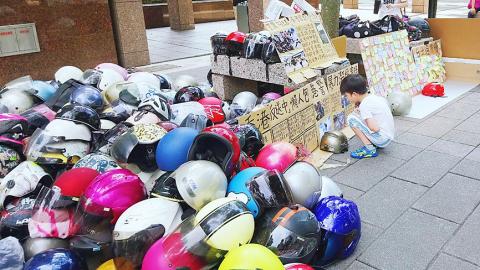A group of Hong Kongers studying in Kaohsiung on Saturday launched a helmet donation drive in support of anti-extradition bill protesters back home, and more than doubled their target of collecting 500 helmets within an hour, one of the organizers said yesterday.
Fooyin University senior Ariel Lam (林沛晞) said they wanted to do something after the protests in Hong Kong turned violent last week.
The protesters face a shortage of supplies, so she and her friends decided to collect second-hand helmets to offer protesters on the front lines better protection, Lam said.

Photo courtesy of Hong Kong Outlanders
Helmets are important because people clad in white shirts and police officers have hit protesters on the head, she said.
By the time the group had finished setting up their collection point in Kaohsiung at 4:30pm on Saturday, many people were already waiting in line to donate, she said.
They began accepting helmets at about 5pm and by 6pm they had 500 helmets, and by the time they closed the drive at 7:30pm they had collected more than 1,000, many of which were new, she said.
They also collected more than NT$100,000, which would go toward supporting the anti-extradition bill protests, she said.
Lam said she was touched by the enthusiasm of people in Kaohsiung and she had not expected so many people to donate.
They want to thank Kaohsiung residents for their generosity and support, as well as the Taiwan Statebuilding Party, formerly known as the Radical Wings, the New Power Party and other parties for helping promote Saturday’s event, she said.
A second drive was held on Sunday in Taipei’s Xinyi District (信義), with the aim of collecting 300 helmets.
The organizers are now looking for a way to send the helmets to Hong Kong, but they did not want to discuss the details to protect their peers, Lam said.
She hopes all Taiwanese can take in what is happening in Hong Kong, she said.
While some Taiwanese might question why Taiwan is at risk of ending up like Hong Kong, she hopes that when voting in next year’s presidential election, Taiwanese would not believe in Beijing’s “one country, two systems” arrangement or a pro-Beijing candidate, she added.

INVESTIGATION: The case is the latest instance of a DPP figure being implicated in an espionage network accused of allegedly leaking information to Chinese intelligence Democratic Progressive Party (DPP) member Ho Jen-chieh (何仁傑) was detained and held incommunicado yesterday on suspicion of spying for China during his tenure as assistant to then-minister of foreign affairs Joseph Wu (吳釗燮). The Taipei District Prosecutors’ Office said Ho was implicated during its investigation into alleged spying activities by former Presidential Office consultant Wu Shang-yu (吳尚雨). Prosecutors said there is reason to believe Ho breached the National Security Act (國家安全法) by leaking classified Ministry of Foreign Affairs information to Chinese intelligence. Following interrogation, prosecutors petitioned the Taipei District Court to detain Ho, citing concerns over potential collusion or tampering of evidence. The

‘FORM OF PROTEST’: The German Institute Taipei said it was ‘shocked’ to see Nazi symbolism used in connection with political aims as it condemned the incident Sung Chien-liang (宋建樑), who led efforts to recall Democratic Progressive Party (DPP) Legislator Lee Kun-cheng (李坤城), was released on bail of NT$80,000 yesterday amid an outcry over a Nazi armband he wore to questioning the night before. Sung arrived at the New Taipei City District Prosecutors’ Office for questioning in a recall petition forgery case on Tuesday night wearing a red armband bearing a swastika, carrying a copy of Adolf Hitler’s Mein Kampf and giving a Nazi salute. Sung left the building at 1:15am without the armband and apparently covering the book with a coat. This is a serious international scandal and Chinese

Seventy percent of middle and elementary schools now conduct English classes entirely in English, the Ministry of Education said, as it encourages schools nationwide to adopt this practice Minister of Education (MOE) Cheng Ying-yao (鄭英耀) is scheduled to present a report on the government’s bilingual education policy to the Legislative Yuan’s Education and Culture Committee today. The report would outline strategies aimed at expanding access to education, reducing regional disparities and improving talent cultivation. Implementation of bilingual education policies has varied across local governments, occasionally drawing public criticism. For example, some schools have required teachers of non-English subjects to pass English proficiency

TRADE: The premier pledged safeguards on ‘Made in Taiwan’ labeling, anti-dumping measures and stricter export controls to strengthen its position in trade talks Products labeled “made in Taiwan” must be genuinely made in Taiwan, Premier Cho Jung-tai (卓榮泰) said yesterday, vowing to enforce strict safeguards against “origin laundering” and initiate anti-dumping investigations to prevent China dumping its products in Taiwan. Cho made the remarks in a discussion session with representatives from industries in Kaohsiung. In response to the US government’s recent announcement of “reciprocal” tariffs on its trading partners, President William Lai (賴清德) and Cho last week began a series of consultations with industry leaders nationwide to gather feedback and address concerns. Taiwanese and US officials held a videoconference on Friday evening to discuss the